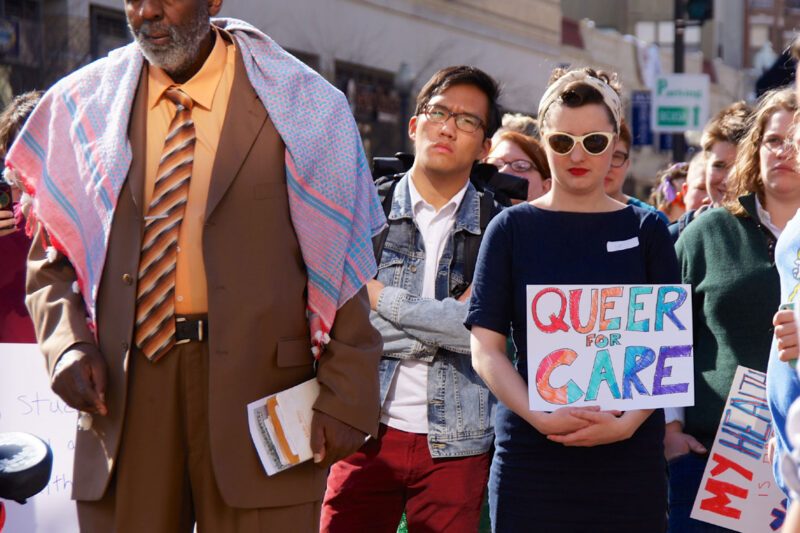
After a routine visit to the gynecologist, I received a letter from my insurance company billing me for almost $2000. The letter explained that the procedure I needed was a “gender specific code [and s]ince the referenced code is inconsistent with the Member’s gender, [the company] is not responsible for any additional payment on this claim[s].”
Basically, an already very unpleasant experience was going to cost me $2,000 because I was listed as male under my insurance. My existence and my body were literally incompatible with the health care system. The inability of the insurance company to process the idea that a man could need a pelvic exam was going to cost me $2,000. For others, for whom these financial costs and the confused stares and discriminatory judgment of medical providers cause the avoidance of preventative care altogether, the incomprehensibility of trans existence in our health care regimes literally costs people their lives.
As a trans person I am very familiar with being denied coverage for medically necessary health care. In law school I took out $10,000 in loans (on top of my educational loans) to pay for care that my insurance company excluded from coverage under a blanket exclusion. Since then, I have been employed in various legal jobs with excellent insurance and still have to navigate regular coverage denials for both transition-related care and care that is deemed “gender specific.”
For me, this has ranged from humiliating to inconvenient to enraging but because of my access to legal information, supportive employers and family, and resources, it has been manageable. For many other trans people, these types of coverage denial lead to negative health outcomes and in tragically too many cases, death.
The data from the National Transgender Discrimination Survey found that 28 percent of the more than 6,000 transgender respondents postponed medical care due to discrimination and another 48 percent did so because they could not afford it. The same survey found that 41 percent of transgender individuals had attempted suicide at some point in their lives compared with 1.6 percent of the general population. The delays and discrimination literally kill people.
This type of systemic discrimination also contributes to the violence that transgender people experience on the streets when others receive the message that our bodies and our lives are disposable. Particularly for transgender women of color, surviving into adulthood remains elusive. As #BlackLivesMatter co-founder Alicia Garza explained, “when the average life expectancy of a Black trans woman is 35 years old in this country, we have a lot farther to go.”
With attention finally being paid to the crisis in our community – a crisis that is disproportionately felt by Black transgender women – policymakers and media outlets are asking what can be done.
Yesterday, the Department of Health and Human Services (HHS) offered a transformative answer to the health crisis facing the transgender community. A proposed rule implementing the non-discrimination provision of the Affordable Care Act (Section 1557) includes critical guidance for improving the health outcomes and lives of transgender people. Though the rule only covers insurance plans purchased on healthcare exchanges and entities that receive federal funding, it has the potential to establish changes in the provision of health care even more expansively.
The proposed rule mandates insurance coverage for “medically appropriate health services” regardless of “sex assigned at birth, gender identity or recorded gender.” It clarifies that care may not be denied based on it being “gender specific” offering for example that “coverage cannot be denied for an individual for whom a pelvic exam is medically appropriate based on the fact that the individual either identifies as a transgender man or is enrolled in the health plan as a man.”
Further, the rule makes explicit that no plan may include blanket provisions excluding coverage for care related to gender transition.
As I wrote after Caitlyn Jenner came out on the cover of Vanity Fair:
“Health care for transgender people remains highly stigmatized and largely unavailable for the majority of trans people. Both private (i.e., employer) and public (i.e. Medicaid) insurance plans continue to have blanket bans on coverage for health care related to gender transition. Even where there has been progress on coverage generally, insurance coverage for care that trans women need is still elusive.
For example, the facial feminization surgery that Caitlyn describes in Vanity Fair is almost universally excluded from coverage. This means that most trans people, particularly trans women of color, cannot access the basic care that they need. It means that going to the doctor feels like a battle — if a trans person can get there at all. It means that trans people participate in criminalized economics like the drug and sex trades to pay for the health care they need or seek the care from friends or unsupervised black markets. It means that trans people die seeking the care they need to live.”
The rule proposed would completely transform the landscape of trans health care and we should be fighting to make sure the final rule includes these critical protections.



